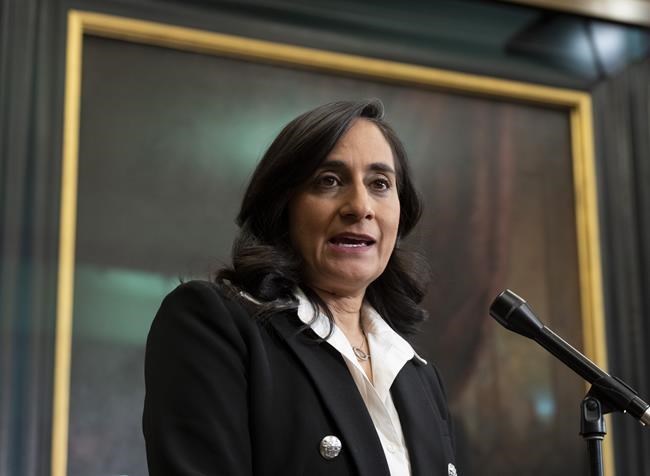OTTAWA — Retired Supreme Court justice Louise Arbour accused military leaders of dragging their feet when it comes fighting sexual misconduct in the ranks on Tuesday, even as Defence Minister Anita Anand staked her reputation on their success or failure.
Arbour delivered her scathing indictment to the House of Commons defence committee six months after issuing dozens of recommendations to improve the military’s handling of inappropriate and criminal sexual behaviour.
Her testimony coincided with an update from Defence Minister Anita Anand on the progress on those recommendations, all of which have now been accepted.
While Arbour acknowledged some positive steps, such as the appointment of an external monitor to keep tabs on the military’s progress, she was exceedingly critical on many other fronts.
Chief among them was what she saw as resistance to one of her key recommendations: That the Canadian Armed Forces be permanently stripped of its jurisdiction over the investigation and prosecution of sexual assault and other related crimes.
“It’s very obvious to me that those involved in that process are dragging their feet on the military side,” said Arbour, who previously served as the United Nations high commissioner for human rights.
In her own update presented before Arbour’s committee appearance, Anand said the government is consulting with provinces and territories about transferring responsibility for sexual crimes from military police and prosecutors to civilian counterparts.
Military officials have also revealed there were difficulties transferring those cases. Anand issued an interim order to do so in November 2021, but civilian police declined to accept 40 out of 97 cases referred to them by military police over the past year.
This comes as some provinces and municipal police forces have complained about the need for more funding and other resources to absorb the military’s cases into their own systems.
However, Arbour suggested such requests for money amounted to “posturing,” given the number of alleged sex crimes involving military personnel each year represents a tiny fraction of the total in the civilian system.
During her appearance before the defence committee, Anand emphasized the importance of acting on the recommendation but rebuffed calls for immediate change, saying several challenges need to be addressed.
Those include how to handle cases outside Canada and the capacity of civilian police and courts to take on more files.
Anand also repeatedly referred to the amount of time needed to change the law to officially remove the military’s jurisdiction over sex offences, but refused to say when legislation would be presented to Parliament for approval.
“My officials will come and present options,” she told the committee. “It would be imprudent of me to simply provide a date to this committee and to Canadians.”
While acknowledging that amending legislation would take time, Arbour noted civilian police already have jurisdiction over such cases if the military decides not to take them.
“Therefore, all that needs to happen today is that the military system stops, and the civilian side takes on investigations of sexual assault and other forms of sexual offences committed by CAF members, on CAF bases or anywhere,” she said.
“So that requires no change whatsoever. Just this: The military side stops, and the civilian side takes it on.”
Anand later pushed back against suggestions that the government and military would repeat past failures by pretending to agree with Arbour’s recommendations only to let them gather dust on a shelf.
“The way that we ensure cultural change occurs in the military is by trying every single day to get it right,” she said. “And the gist of my tenure as minister of national defence is to ensure that that occurs.”
Arbour also took issue with the military’s failure to remove “the duty to report,” which requires that troops report inappropriate or criminal behaviour even if the victim doesn’t agree. That had been flagged as a major issue by victims’ groups.
The former judge also blasted the Armed Forces for not having launched a promised review on the costs and benefits of Canada’s two military colleges — and accused them of having already decided that closing the institutions isn’t on the table.
“We’re now seven months after the production of my report … and we’re still at a stage of examining parameters and terms of reference,” she said.
“All of that against the backdrop of a suggestion that the military colleges as they exist are ‘superior institutions.’ It doesn't suggest the kind of open mind with which I think this kind of exercise should be undertaken.”
Anand in her own testimony said the review will be focused on the quality of education, socialization and military training at the Royal Military College in Kingston, Ont., and its French counterpart in Saint-Jean-sur-Richelieu, Que. — not whether they are required.
“These colleges attract some of the best that Canadian society has to offer,” she said. “But let's be clear: The culture at our military colleges must change significantly, and we will ensure that this occurs.”
This report by The Canadian Press was first published Dec. 13, 2022.
Lee Berthiaume, The Canadian Press



